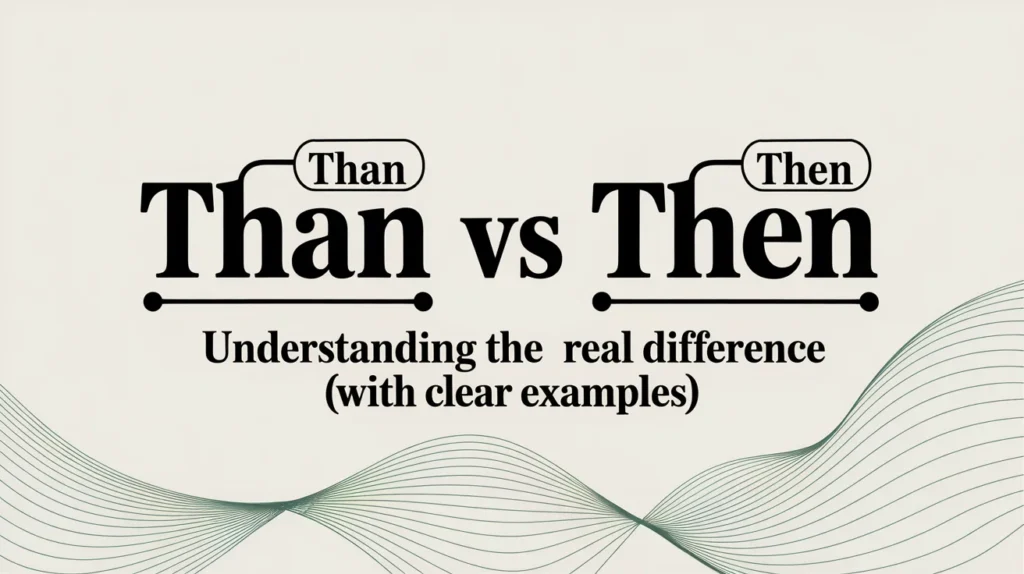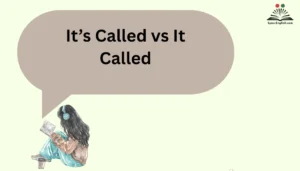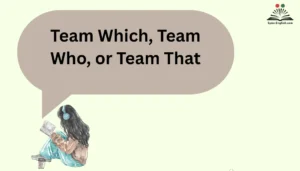Why Do We Keep Mixing Up “Than” and “Then”?
Let’s face it—we’ve all stumbled over “than” vs “then” at some point. Maybe you typed out an email and paused, unsure whether to say “better than” or “better then.” Or maybe a social media comment made you cringe because someone wrote, “I’d rather eat cake then cookies.”
This confusion isn’t just a grammar geek issue. It crops up in business communication, job applications, and even casual texts. And it can totally change the meaning of your sentence.
So, why do we keep mixing them up?
Because they sound similar, they’re spelled nearly the same, and auto-correct isn’t always our friend. But here’s the good news: learning the difference between “than” and “then” isn’t complicated once you break it down. With the right examples, rules, and tips, you’ll never have to second-guess yourself again.
This post will clear up the confusion for good. We’ll look at how and when to use “than” or “then,” dig into tricky phrases, review common mistakes, and even explore where these words come from. Whether you’re writing a school paper, business proposal, or just want to sharpen your English, you’re in the right place.
“Than” vs “Then” – A Quick Snapshot
To start off, here’s a clear side-by-side table that shows the core difference:
| Feature | Than | Then |
| Part of Speech | Conjunction / Preposition | Adverb / Noun / Adjective |
| Main Use | Comparison | Time, sequence, consequence |
| Example | She’s taller than me. | We ate dinner, then watched TV. |
| Common Confusion | Used incorrectly in place of “then” or vice versa | Happens due to similar spelling and sound |
Both words have important but very different roles. Let’s break each one down in detail.
When to Use “Than”
Grammatical Role of “Than”
“Than” is primarily used to make comparisons. It often follows comparative adjectives or adverbs—like faster, taller, more interesting, etc.
It functions as a conjunction connecting two parts of a comparison:
- She is smarter than her brother.
- I’d rather study than party tonight.
You might also see it as a preposition, especially in informal language:
- No one other than you could help me with this.
Examples of “Than” in Sentences
Let’s look at some real-world examples:
- Comparison: This car is more efficient than that one.
- Preference: I’d rather go hiking than stay indoors.
- Exclusion: Other than that issue, everything looks good.
A good way to remember:
“Than” equals comparison. If you’re weighing two things, use “than.”
When to Use “Then”
Grammatical Role of “Then”
“Then” is an adverb, but it can also be used as a noun or even an adjective, depending on context. Its primary function is to relate to time, sequence, or cause and effect.
It answers “when?”, “what happened next?”, or “what was the result?”
Examples of “Then” in Sentences
- Sequence: We went to the store, then got ice cream.
- Time: Back then, I didn’t know how to drive.
- Condition: If you’re ready, then let’s go.
- Result: He didn’t study, and then he failed the test.
To lock it in:
“Then” = time, order, or result. If it answers “when?” or “what next?”, it’s probably “then.”
Than vs Then: Real-World Use Cases Compared
Here’s a side-by-side list of correct and incorrect sentences using both words to reinforce the difference:
| Incorrect Usage | Corrected Sentence |
| She is taller then me. | She is taller than me. |
| We’ll go to dinner than the movie. | We’ll go to dinner then the movie. |
| I’d rather nap then clean. | I’d rather nap than clean. |
| If it rains, than we’ll cancel. | If it rains, then we’ll cancel. |
You can see how a small change completely alters the meaning—or just makes the sentence wrong.
Common Mistakes and How to Avoid Them
Even experienced writers mess this up. Let’s look at some of the most frequent issues:
Top 5 Mistakes
- Using “then” after comparatives
- ❌ He’s stronger then you.
- ✅ He’s stronger than you.
- Using “than” to show sequence
- ❌ We had dinner than went out.
- ✅ We had dinner then went out.
- Copy-paste errors or autocorrect
- Even AI-based tools get it wrong!
- Sound-alike confusion in fast speech
- The words sound similar when spoken quickly.
- Homophone-like assumptions
- They’re not true homophones, but close enough to fool the brain.
Quick Fix: The T.E.S.T. Method
Here’s a simple mnemonic:
- Time? → Use Then
- Effect/result? → Use Then
- Sequence? → Use Then
- Than = Comparison
Stick to this and you’ll nail it every time.
Tricky Phrases: Do You Say “Other Than” or “Other Then”?
Correct Usage of “Other Than”
“Other than” is used for exclusion or exception.
- Other than the broken light, the car runs great.
- Nobody else knew about it other than him.
It can also be used for contrast:
- She’s nothing other than amazing.
Why “Other Then” Is Incorrect
“Other then” makes no grammatical sense. It’s not a real English phrase and doesn’t follow the structure of either word’s standard usage.
✅ Use “other than” for contrasts or exceptions.
Which Is Correct: “More Than” or “More Then”?
When to Use “More Than”
“More than” is used for quantity, comparison, or preference.
- More than 50 people attended.
- He works more than she does.
Why “More Then” Is a Grammar Trap
“More then” is almost always wrong unless it appears in a specific context like:
- We worked all day. More then, we rested. (Even here, “then” is awkward)
In most scenarios:
✅ Use “more than” to indicate amount or comparison.
“Rather Than” or “Rather Then”? Let’s Settle It
How “Rather Than” Works in English
This phrase is all about preference and choice.
- I’d rather eat tacos than burgers.
- Rather than complain, do something about it.
Parallel sentence structure is key here:
Rather than [verb], [verb].
Why “Rather Then” Sounds Right but Isn’t
It’s a phonetic trap. It sounds natural when said quickly, but grammatically, “rather then” is incorrect.
Wrong:
- Rather then go home, I stayed late.
Right:
- Rather than go home, I stayed late.
The Origins: Etymology of “Than” and “Then”
Etymology of “Than”
“Than” comes from Old English “þanne” or “þan”, which evolved from Germanic roots. It was originally used to indicate time, like “then,” but shifted in the 17th century to show comparison.
Fun fact:
Before standardization, “than” and “then” were often interchangeable!
Etymology of “Then”
“Then” comes from Old English “þænne”, meaning at that time. Over time, it expanded to express sequence, consequence, and result.
Historical texts show:
- “Then the knight rode forth…” (1200s English poetry)
Understanding the roots helps you see how English evolved—and why these words still trip people up.
Than vs Then: Quick Recap and Final Tips
Here’s a summary table to bring it all home:
| Word | Function | Used For | Example |
| Than | Conjunction/Preposition | Comparisons | She’s taller than me. |
| Then | Adverb/Noun/Adjective | Time, sequence, consequence | We went to dinner, then a movie. |
Final Tips
- Think comparison? → than
- Think time/order/result? → then
- When in doubt, say the sentence out loud. If it sounds like a comparison, it probably needs than.
FAQ: Clearing Up Final Confusions
Can “then” ever be used in a comparison?
No. Never. Comparisons always require “than.”
Is “than” ever an adverb?
No. It’s either a conjunction or preposition, not an adverb.
Why do so many people get it wrong?
Auto-correct, lazy editing, and fast speech make the mistake easy to make—and hard to spot.
Interactive Practice Section
Try these!
Choose the correct word:
- She’s smarter (than/then) her brother.
- We went shopping and (than/then) got lunch.
- I’d rather stay home (than/then) go out.
- If you’re ready, (than/then) we can go.
Answers: 1. than, 2. then, 3. than, 4. then
Conclusion: Stop Guessing — Start Using “Than” and “Then” Correctly
You now know the difference. You’ve seen the rules, examples, tables, and traps. You’ve even peeked into the etymology.
Mastering “than vs then” gives your writing more clarity, professionalism, and polish.
Bookmark this post, come back to it whenever you need a refresher, and share it with someone who’s still typing “more then” in their emails.
And remember: It’s better to learn it right than fix it later.

Emma Rose is an experienced English educator, writer, and language enthusiast dedicated to helping learners unlock the full power of the English language. At SynoEnglish, she shares practical grammar tips, clear explanations, and real-world language insights to make learning both effective and enjoyable. With a passion for words and a love for clarity, Emma’s goal is to help readers speak and write with confidence.



